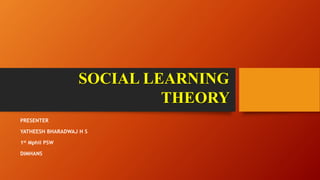SOCIAL LEARNING THEORY.pptx
•Télécharger en tant que PPTX, PDF•
0 j'aime•69 vues
SOCIAL LEARNING THEORY
Signaler
Partager
Signaler
Partager

Recommandé
Recommandé
Contenu connexe
Similaire à SOCIAL LEARNING THEORY.pptx
Similaire à SOCIAL LEARNING THEORY.pptx (20)
Observational Learning Theory and Its Application.pdf

Observational Learning Theory and Its Application.pdf
Albert bandura; Social Learning Theory (psychology topic)

Albert bandura; Social Learning Theory (psychology topic)
Plus de Yatheesh Bharadwaj H S
Plus de Yatheesh Bharadwaj H S (17)
SOCIAL DIAGNOSIS IN MENTAL HEALTH AND ITS IMPORTANCE.pptx

SOCIAL DIAGNOSIS IN MENTAL HEALTH AND ITS IMPORTANCE.pptx
Dernier
This presentation was provided by William Mattingly of the Smithsonian Institution, during the fourth segment of the NISO training series "AI & Prompt Design." Session Four: Structured Data and Assistants, was held on April 25, 2024.Mattingly "AI & Prompt Design: Structured Data, Assistants, & RAG"

Mattingly "AI & Prompt Design: Structured Data, Assistants, & RAG"National Information Standards Organization (NISO)
Dernier (20)
Unit-IV; Professional Sales Representative (PSR).pptx

Unit-IV; Professional Sales Representative (PSR).pptx
Ecological Succession. ( ECOSYSTEM, B. Pharmacy, 1st Year, Sem-II, Environmen...

Ecological Succession. ( ECOSYSTEM, B. Pharmacy, 1st Year, Sem-II, Environmen...
This PowerPoint helps students to consider the concept of infinity.

This PowerPoint helps students to consider the concept of infinity.
Basic Civil Engineering first year Notes- Chapter 4 Building.pptx

Basic Civil Engineering first year Notes- Chapter 4 Building.pptx
Beyond the EU: DORA and NIS 2 Directive's Global Impact

Beyond the EU: DORA and NIS 2 Directive's Global Impact
Mattingly "AI & Prompt Design: Structured Data, Assistants, & RAG"

Mattingly "AI & Prompt Design: Structured Data, Assistants, & RAG"
Presentation by Andreas Schleicher Tackling the School Absenteeism Crisis 30 ...

Presentation by Andreas Schleicher Tackling the School Absenteeism Crisis 30 ...
Unit-V; Pricing (Pharma Marketing Management).pptx

Unit-V; Pricing (Pharma Marketing Management).pptx
Z Score,T Score, Percential Rank and Box Plot Graph

Z Score,T Score, Percential Rank and Box Plot Graph
SOCIAL LEARNING THEORY.pptx
- 1. SOCIAL LEARNING THEORY PRESENTER YATHEESH BHARADWAJ H S 1st Mphil PSW DIMHANS
- 2. • Introduced by psychologist Albert Bandura • Albert Bandura is best known for his work in the following areas: Bobo doll studies Observational learning Self-efficacy Social learning theory
- 3. Core Concepts of Social Learning Theory • First is the idea that people can learn through observation. • internal mental states are an essential part of this process. • This theory recognizes that just because something has been learned, it does not mean that it will result in a change in behavior.
- 4. • learning occurs through observation, imitation, and modeling • influenced by factors such as attention, motivation, attitudes, and emotions. • Interaction of environmental and cognitive elements that affect how people learn.
- 5. People Can Learn Through Observation • Involved a doll named Bobo • Bandura demonstrated that children learn and imitate behaviors they have observed in other people. • The children in Bandura’s studies observed an adult acting violently toward a Bobo doll. When the children were later allowed to play in a room with the Bobo doll, they began to imitate the aggressive actions they had previously observed
- 8. • A live model, which involves an actual individual demonstrating or acting out a behavior. • A symbolic model, which involves real or fictional characters displaying behaviors in books, films, television programs, or online media. • A verbal instructional model, which involves descriptions and explanations of a behavio
- 9. Mental States Are Important to Learning • Bandura noted that external, environmental reinforcement was not the only factor to influence learning and behavior. And he realized that reinforcement does not always come from outside sources. • Your own mental state and motivation play an important role in determining whether a behavior is learned or not.
- 10. ASSUMPTIONS • People learn through observation. Learners can acquire new behavior and knowledge by merely observing a model. • Reinforcement and punishment have indirect effects on behavior and learning. People form expectations about the potential consequences of future responses based on how current responses are reinforced or punished. • Mediational processes influence our behavior. Cognitive factors that contribute to whether a behavior is acquired or not. • Learning does not necessarily lead to change. Just because a person learns something does not mean they will have a change in behavior.
- 12. • Attention: The degree to which we notice the behavior. A behavior must grab our attention before it can be imitated. Considering the number of behaviors we observe and do not imitate daily indicates attention is crucial in whether a behavior influences imitation.
- 13. • Retention: How well we remember the behavior. We cannot perform the behavior if we do not remember the behavior. So, while a behavior may be noticed, unless a memory is formed, the observer will not perform the behavior. And, because social learning is not immediate, retention is vital to behavior modeling.
- 14. • Reproduction: The ability to perform the behavior. This is the ability to reproduce a behavior we observe. It influences our decision about whether to try performing the behavior. Even when we wish to imitate an observed behavior, we are limited by our physical abilities.
- 15. • Motivation: The will to emulate the behavior. This mediational process is referred to as vicarious reinforcement. It involves learning through observing the consequences of actions for other people, rather than through direct experience.
- 16. THANK YOU